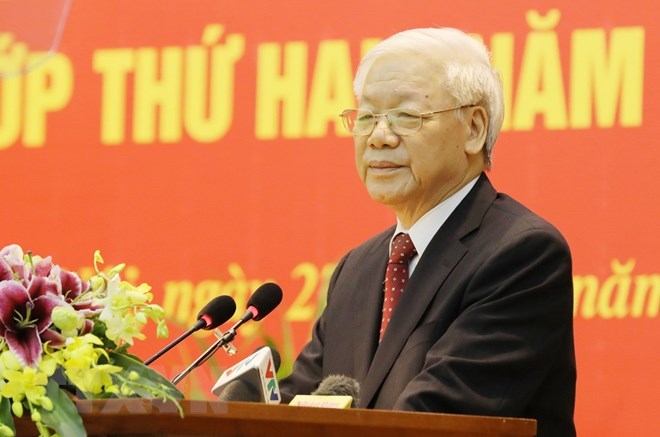
During a visit to Russia from September 5 to 8, General Secretary of the Communist Party of Vietnam Central Committee Nguyen Phu Trong and President Vladimir Putin and other Russian leaders will discuss measures to promote the countries' relations.
 |
| General Secretary of the Communist Party of Vietnam Central Committee Nguyen Phu Trong. |
During a visit to Russia from September 5 to 8, General Secretary of the Communist Party of Vietnam Central Committee Nguyen Phu Trong and President Vladimir Putin and other Russian leaders will discuss measures to promote the countries’ relations.
The Party leader revealed his plans for the trip during an interview with Russian news agency TASS ahead of the visit.
He said the visit will be made amidst developing bilateral relations and on the threshold of the 25th anniversary of the signing of a treaty on basic principles for Vietnam-Russia friendship in 2019 and 70 years of diplomatic ties in 2020.
It aims to intensify the countries’ comprehensive strategic partnership, connectivity and cooperation in all spheres, he noted, voicing his belief that the visit will create new momentum for this partnership and improve bilateral cooperation for the sake of the two peoples and for peace, stability and development in Asia-Pacific.
Reviewing the countries’ ties, General Secretary Trong affirmed that Russia is an important traditional partner of Vietnam. Their people have supported each other over the past seven decades. The Vietnamese people never forget the assistance, both materially and spiritually, that people of the former Soviet Union and Russia have given during the fight for national independence in the past and development efforts at present.
Russia is also one of the countries with the biggest numbers of Vietnamese people. Meanwhile, the Southeast Asian nation has become an attractive destination for Russian tourists. These are crucial factors helping enhance the friendship and mutual understanding between the two peoples, he added.
The leader told TASS that Vietnam respects and prioritises reinforcing the comprehensive strategic partnership with Russia. Since this partnership was formed in 2012, political relations have been strengthened. The two sides have maintained exchange mechanisms while economic-trade, investment and security-defence ties have been solidified.
The partnership between Vietnam and Russia is developing in a substantive and sustainable fashion, he said.
However, he also pointed out that bilateral economic-trade connections remain modest. Since the Vietnam-Eurasian Economic Union Free Trade Agreement took effect in October 2016, the two countries’ trade has grown by some 30 percent over the past two years to 3.5 billion USD in 2017, which is still very low and not on par with their sound political ties, potential and expectations.
“We want this field to develop more strongly and soon become a true pillar of the two countries’ relations in the time ahead,” General Secretary Trong noted.
Regarding energy cooperation, he said there remains much room for them to boost ties in this area, adding that Vietnam always welcomes and creates the best conditions for Russian firms to modernise the power plants built with the help of the Soviet Union and take part in new energy projects.
Meanwhile, collaboration in the oil and gas industry has increased and is a strategic and long-term cooperation field in terms of both politics and economy.
The leader said an important direction of energy ties is using atomic energy for peaceful purposes. The countries agreed to build a centre for nuclear science and technology in Vietnam. It is a critical project for both sides, aiming to develop nuclear science and technology, train high-quality staff and step up the application of atomic energy in economic, social, scientific and technological areas.
In the interview, the Party chief also said bilateral cooperation in defence-security and military techniques has expanded, showing the countries’ mutual trust.
He noted: “I highly value the very effective and dynamic cooperation between the two countries, especially in such cooperation fields as personnel training, United Nations peacekeeping, navy, military medicine, military technique, defence industry… In the coming time, cooperation in defence-security between the two countries will continue playing an important role in the overall comprehensive strategic partnership.”
(Source: VNA)




